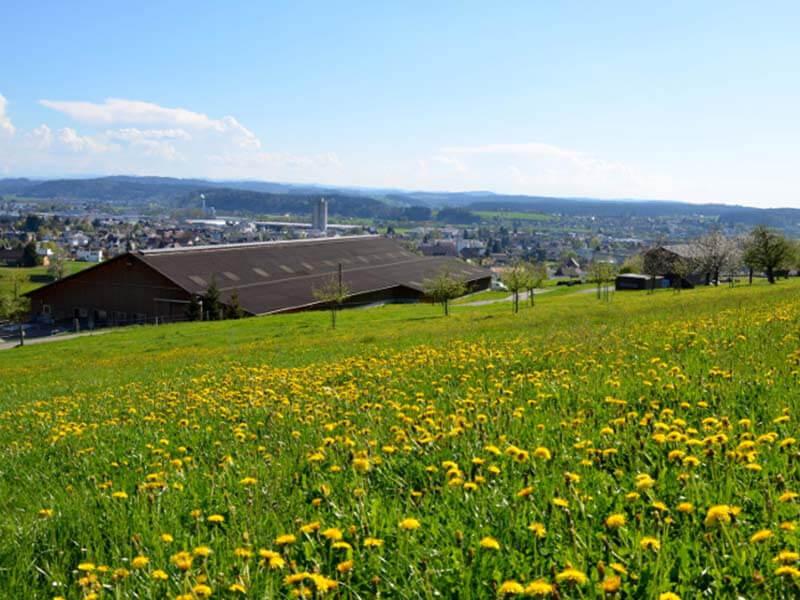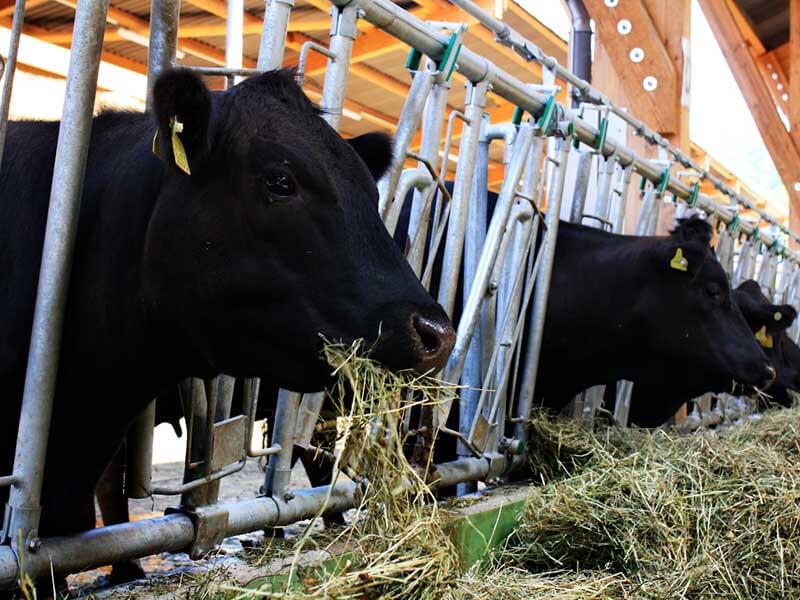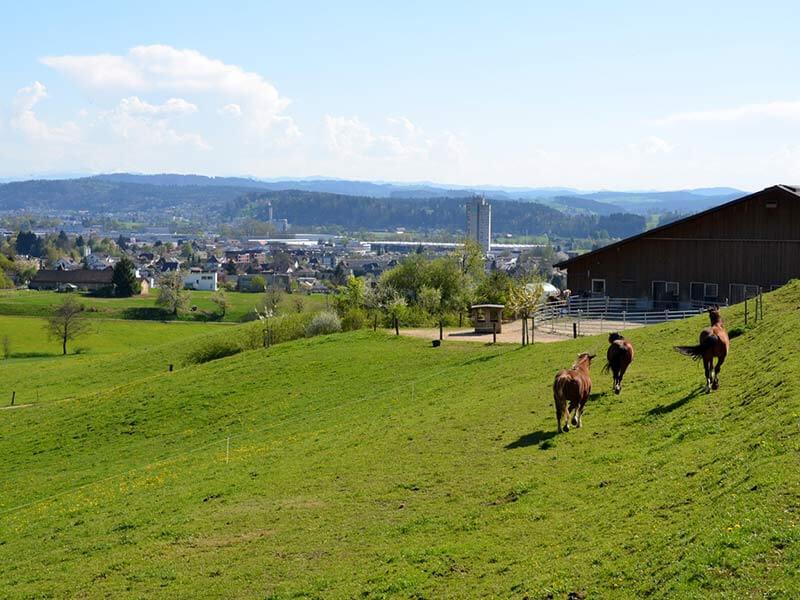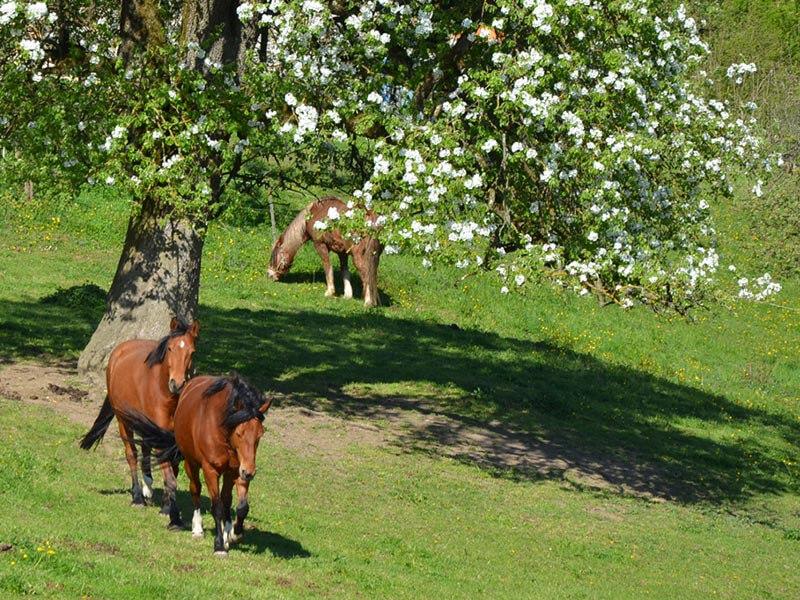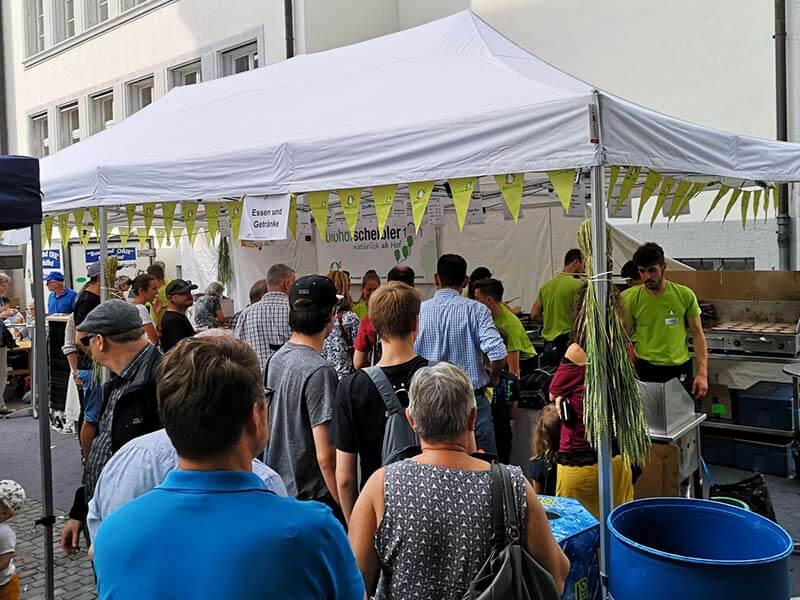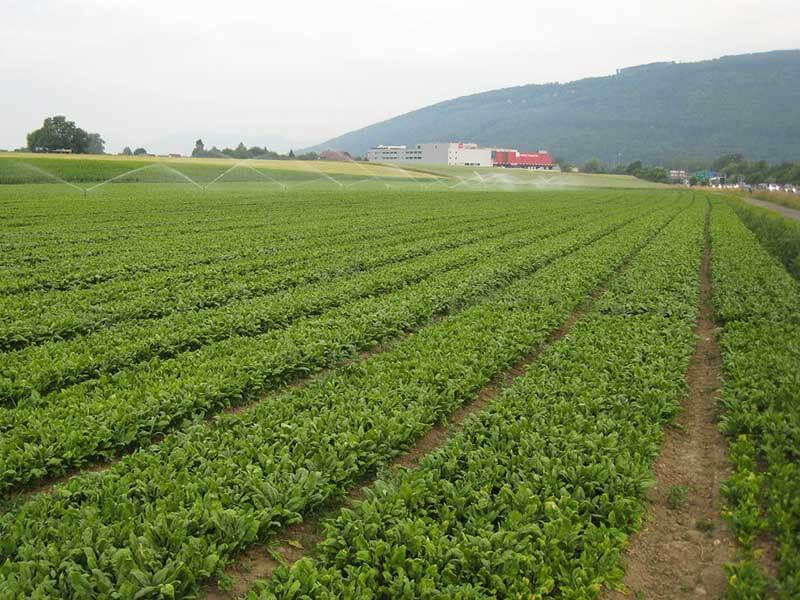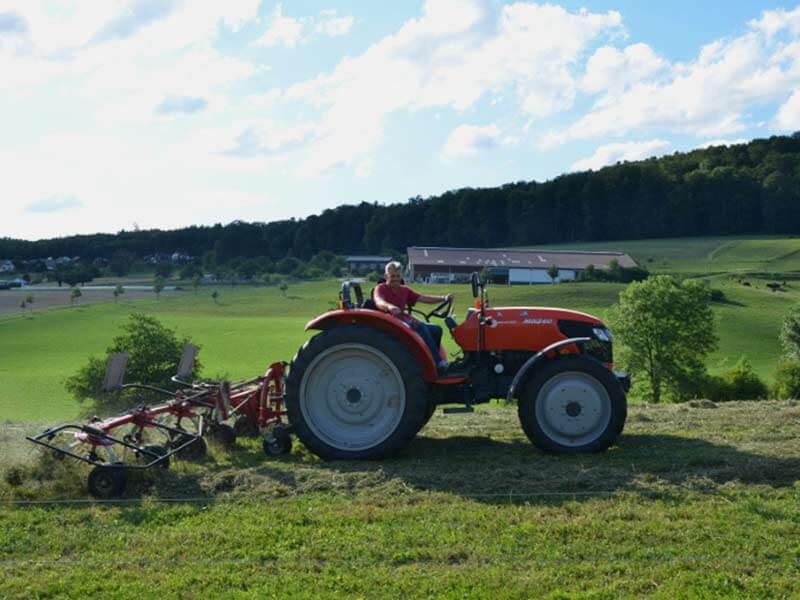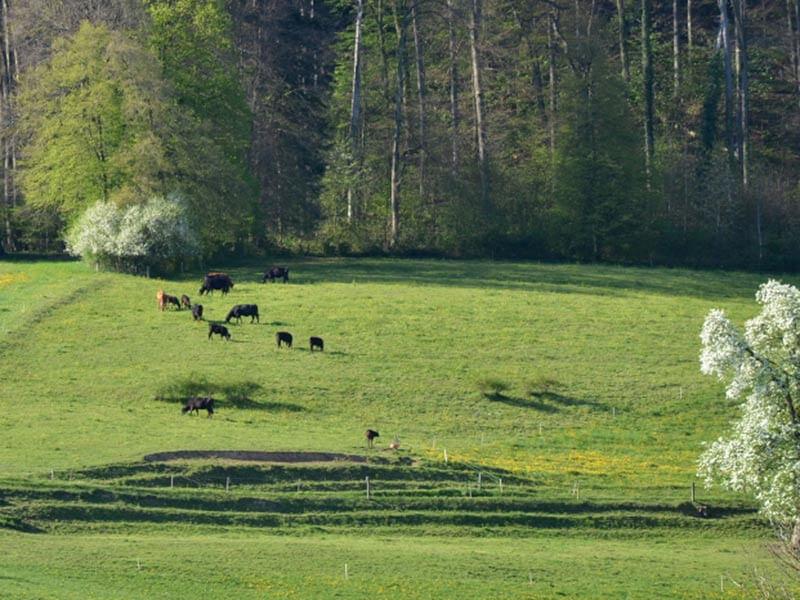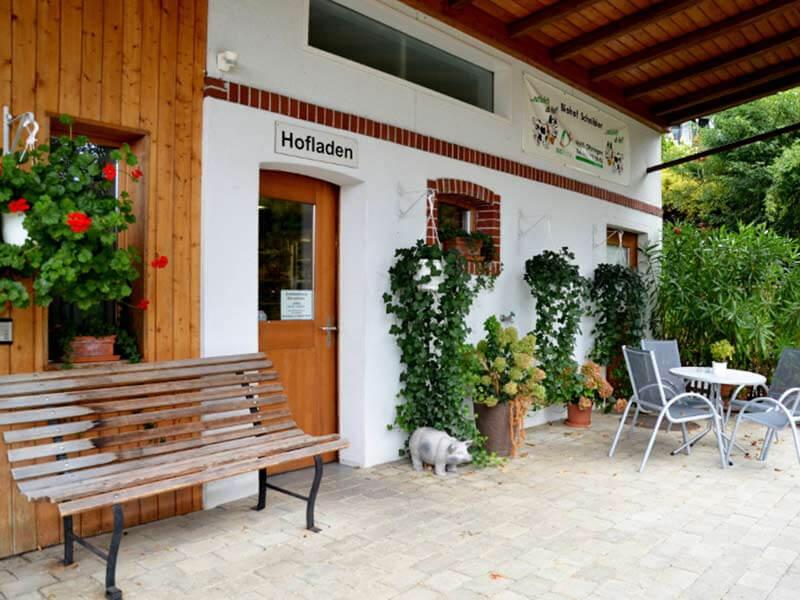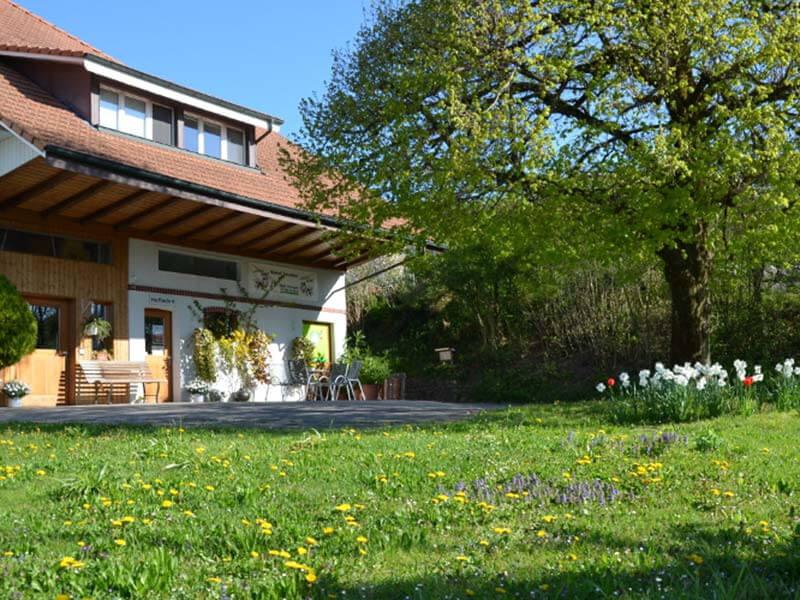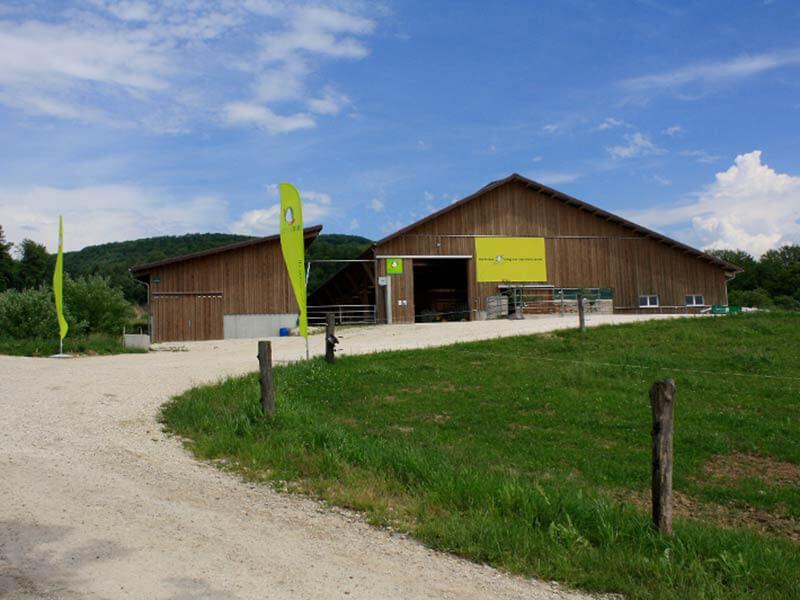
Organic farm Scheibler
Dieter Scheibler and his family run Biohof Scheibler and the Lerbhaldenhof in Oftringen in the Swiss canton of Aargau.
Dieter is a passionate organic farmer and is involved with various organic agriculture organisations.
Animal husbandry on his farms meets Bio Suisse Bud and KAG-Freiland standards, with the animals enjoying the freedom of the outdoors every day. In addition the Scheiblers avoid using growth-promoting additives, animal proteins and fats and of course genetically modified feedstuffs.
For Dieter Scheibler and his family, producing food in harmony with nature is a matter of course. They are committed to sustainable agriculture and a healthy environment. This approach also protects biodiversity and preserves it for the future. The family eat only organic food.
The farmland comprises 7.5 ha of natural grassland, 5.3 ha of ecological compensation areas, 0.8 ha of hedges and copses, 9 ha of temporary grassland, 4.6 ha of wheat, 3.7 ha of barley, 5.5 ha of peas and beans and 2.2 ha of spinach. The barn accommodation was built in 2007 and has room for up to 60 mother cows (Angus hornless) and their calves, 20 heifers, six livery horses and a bull. The animals feed exclusively on grass and hay. The calves are slaughtered at a small abattoir that is very close by.
The produce is always fresh: meat, vegetables, flour and grains of various sorts and 200 other products needed on a daily basis are available from the farm shop, which is open from 9.00 to 20.00, and online at www.biohof-scheibler.ch.
We talked to Dieter Scheibler.
Mr Scheibler, you went organic in 1996. What caused you to do that?
I grew up with organic farming. My parents went for organic farming back in 1953 and with Dr Hans Müller of the Möschberg (www.bioforumschweiz.ch) they campaigned for organic methods. After flirting briefly with conventional farming, it quickly became clear to me that organic is the right thing for us.
Do you eat only organic products? If so, why?
For me it is the obvious thing to do. An organic farmer produces the finest food and lives from the proceeds of selling it. So he should eat it himself and encourage others around him to do the same – if he doesn’t he has missed the point of organic farming. The same should apply to the people who work for bio.inspecta AG – there are virtually no excuses.
Are all products available in organic versions?
I can’t immediately think of any that aren’t. Except perhaps some semi-luxuries that we buy for pleasure rather than nutrition. All the products that you use every day are available in organic versions – perhaps not at the big retailers, but at organic shops and organic farm shops all over Switzerland. Organic farmers themselves can buy things from neighbouring organic farmers if they don’t have a farm shop of their own or don’t produce a full range of products. Unfortunately people don’t do that nearly often enough, because competitive thinking frequently gets in the way.
In my view everything that comes from the farm should be organic. What do you think about that?
There will always be conventional and organic products. But organic farmers shouldn’t have to apologise for farming organically. A hundred years ago people knew of nothing else, until the first chemical and synthetic substances came on the market and were used in vast quantities.
There is a widespread fear that going organic means growing less or simply not growing enough. But bear in mind that we throw away or waste a huge amount of food – or, even worse, eat too much.
I am amazed how much food is thrown away – perhaps because a carrot is too small, too crooked or not orange enough. Where does that lead?
It’s a tricky issue. At harvest time carrots are downgraded to animal fodder if they are too small or if there is a surplus of carrots that year. When you sow the crop you don’t know how many carrots the harvest will produce. In the vegetable sector there is therefore always too much or too little. Nature decides that very quickly and mercilessly.
Are there also surpluses in organic farming?
Yes, in organic farming there can also be too much. I am not sure whether the apples that were picked last year can all be eaten. In 2018 there was a record apple harvest.
As a farmer you have to ask yourself in that situation whether you should turn the apples into juice straight after the harvest or leave it until May, when you have looked after the apples for months and paid expensive storage costs for them and then discovered that you can’t sell them because there are too many on the market.
In the organic sector that is decided by the Swiss Fruit Association and ultimately also by consumers, who decide how much they want to eat of what. For example, last spring we had to dispose of hundreds of tonnes of potatoes because the previous year’s harvest had been so big. What other options do you have if you can’t sell them?
So too much for the Swiss population?
That’s right, but you can’t export them. Consumers should return to buying more seasonal produce – that could reduce the surplus. But people tend to forget that.
Isn’t that because many people no longer even know what is in season when?
That’s right. We keep drawing attention to the issue, but people quickly forget about it; if consumers fancy having strawberries at Christmas, then they buy them, regardless of where they come from.
You are the organic officer of the Swiss Vegetable Growers Association, the professional association for vegetable producers. You are also head of the vegetable group at Bio Suisse and a delegate of Bio Suisse Aargau. You are very involved.
All those things are linked. In the Swiss Vegetable Growers Association (VSGP) I am a member of the management committee because I head the vegetable group at Bio Suisse.
I have been a delegate of Bio Suisse Aargau since 2005 and still hold that position. I am also on the vegetable processing board and represent the organic producers there.
The more you are linked into the whole thing, the better your understanding of the connections and your ability to make a difference. Because I am an independent producer, I can express myself more clearly than pure vegetable producers could do. So I represent their interests.
What do you mainly campaign for in these committees?
Organic farming doesn’t stand still. There are lots of questions that we need to answer. What nutrients should people be allowed to use in organic farming in future? Who will sell Bio Suisse Bud products in future, and what products can carry the logo?
There are the breeding problems in crop production, the ever smaller choice of seed because more and more comes from the same source, the CO₂ emissions that affect us all. The standards must be constantly adjusted, the boundaries drawn tighter, because there are always some people who push the boundaries too far. As an inspection body you at bio.inspecta detect these cases. But there are also cases in which we have to adapt the standards. There are some challenges that must be dealt with immediately, while for others there is a bit more time.
What innovations and new features can we expect in the production and consumption of organic products?
The nice thing about innovation is that things happen spontaneously – something new is developed or comes on the market – you never know in advance. Rather more organic consumers and rather less “blah blah blah” would be good.
Is organic now more established than it was a couple of years ago?
Yes, but some things are stagnating. There is a problem with pork: at the moment the whole market is collapsing. We can’t halt the fall in prices because we have a few pigs too many. We are talking about 20 to 30 pigs a week that are ruining the whole market. It is sad that we can’t persuade consumers to buy organic pork. That would counteract the fall in prices. Unfortunately, consumers are still buying conventional pork because it is a whole lot cheaper and they don’t know what goes into organic farming.
Consumers need to be informed in far more detail about what organic farming means. Organic farming isn’t necessarily to do with animal welfare – that’s what animal welfare bodies are there for. Organic farming is about much more than that. And the biggest challenge that we will have to face at Bio Suisse in the next ten years is persuading producers to go on producing for Bio Suisse and not simply switch to the standards of the Swiss Ordinance on Organic Farming. The costs and paperwork for producers are not to be underestimated and it doesn’t get easier or cheaper. In addition, many farmers don’t know how they could handle administrative processes more simply.
The best innovation would be to simplify the whole procedure.
And how could it be simplified?
By carrying out the inspections only every other year, but definitely making an unannounced visit once in the two years. That would minimise the paperwork, the effort involved and the costs.
And how do you persuade customers to eat only organic food?
Well, that’s simple. Why do they choose to eat conventionally? The answer is usually “because it’s cheaper”, but that is incorrect. People who pay attention to what they eat live more cheaply. If you look at the contents of the average person’s shopping trolley, you find that they only need to take a quarter of the stuff home – the rest is things they don’t really need. In other words, they could have saved three-quarters of the cost, spent a bit more on organic products and still saved money.
How does one raise customers’ awareness?
Mainly via the subject of health. As soon as customers come up against health problems, such as allergies, they think more about what they eat. They pay more attention to where the food comes from and how it is treated. Then the desire for healthy food takes them to the organic shops and organic farm shops. For many consumers it is not the organic aspect that they focus on but the quality and origin of the food in organic shops and organic farm shops.
Why are organic inspections important?
They give a feeling of security – for both sides. As a farmer I know that I am getting things right if the inspection doesn’t throw up any irregularities – and if it does, they are brought to my attention and I can respond. Of course there are some nitpickers who make life more difficult for us, but most inspectors support the producers and point them in the right direction. If producers are unhappy, they first change their inspection body. If that doesn’t work, they then just produce food that meets the requirements of the Swiss Organic Farming Ordinance. An inspection body is still involved, but the requirements are easier.
Or they go back to conventional farming…
Back to conventional methods? Then they weren’t organic farmers at all but “economic migrants”. An organic farmer who produces organic products out of conviction doesn’t go back to conventional farming.
But back to your question: inspections are important because they provide security both for us and for consumers. The customer can be certain that the inspected products really are organic and meet the standards and the producer knows that he is doing everything right.
But things are not simple in Switzerland. The country is very small and organic and conventional farms are so close together – how do you make sure that organic products are not contaminated by a neighbour?
Organic producers take various steps to ensure that doesn’t happen. If contaminants do still get into the field, the inspection body is informed. The nature of the incident is identified and appropriate action is taken. In some situations it can be very expensive for conventional farmers – for example, if it turns out that they have sprayed their fields in a strong wind.
Isn’t the complexity of organic farming one of the reasons why a lot of producers give in at some point?
That may indeed be one of the reasons. But one mustn’t forget that conventional farmers and IP Suisse farmers are also inspected. And they have to fill in logs and record everything so that they get their direct payments.
An interesting topic that needs to be explored in depth in order to understand all the linkages.
Yes, it is interesting and will remain so. The organic movement never stands still and it is certainly not always easy to keep up. You have to know a lot – even consumers have to. But you should take the time and learn about it, for the sake of your health and also for the future of our nature.

